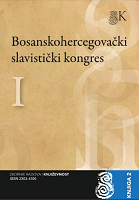Spisateljstvo franjevaca Bosne Srebrene u književnoj historiografiji
The Treatment of Literary Works of Franciscans from the Province of Bosna Srebrena in Literary Historiography
Author(s): Dolores GrmačaSubject(s): History of Church(es), Croatian Literature, 17th Century, 18th Century, Theory of Literature, Sociology of Religion, History of Art, Sociology of Literature
Published by: Slavistički komitet BiH
Keywords: franciscan literature; Bosna Srebrena; literary historiography; standard language; integration processes; literary canon;
Summary/Abstract: The important role of franciscans from the province of Bosna Srebrena in the pre-19th century Croatian literature has regularly been recognised in literary historiography. Some of the facts that have been commonly stressed include, for instance, the claim that it was only through the activities of franciscan monks on the periphery of the powerful Ottoman Empire that Croatian literature existed in Bosnia in this period. Furthermore, their literary activities have generally been desribed as inspired by Catholic Revival, and hence as primarily religious and didactic. The most popular are said to have been different religious texts carrying “all traditional ‘baggage’ of medieval catholicism” (Krešimir Georgijević). Thus, on the one hand, literary historians insist on the pragmatic role and low aesthetic value of franciscan literature, but, on the other, emphasise the crucial role of franciscan literary activities in the 17th and 18th centuries, which paved the way for the establishment of modern Croatian standard language. It seems therefore paradoxical that franciscan popular literature, which participated in the key processes of standard language formation, has been completely marginalised in Croatian literary canon. This paper focuses on various strategies employed in defining the position of franciscan literature within this canon, which is as a rule located within the borders of cultural periphery. Uncovering the mechanisms of national canon formation should provide further insight into the process of positioning of popular literature and the socio-cultural context of literature in Bosnia and Herzegovina, which, having developed no forms of high literature during the 17th and 18th centuries, existed only in its popular forms.
Journal: Bosanskohercegovački slavistički kongres
- Issue Year: I/2012
- Issue No: 2
- Page Range: 119-132
- Page Count: 14
- Language: Croatian

